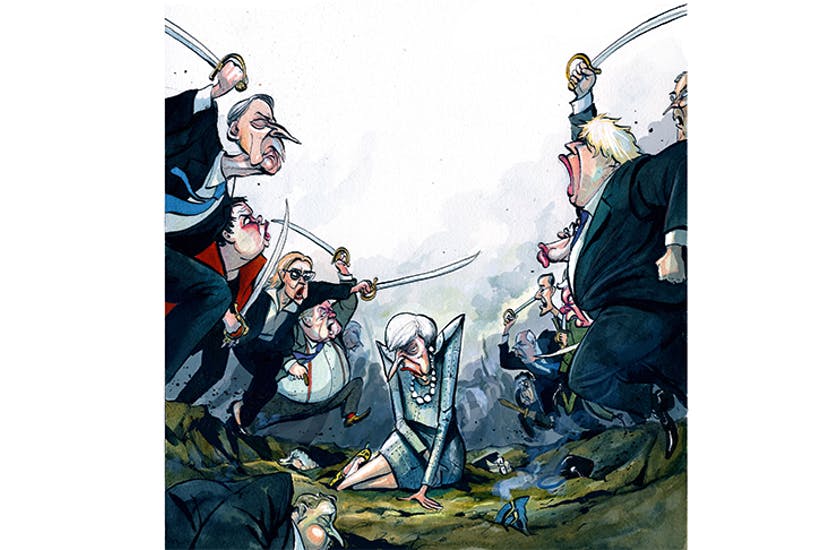It has not been a great few weeks for David Davis, the government’s designated Brexit Bulldog. In the first place, his ambition to succeed Theresa May as leader of the Conservative party and prime minister looks and feels increasingly at-odds with the temper of the times. I suppose parading buxom lasses in figure-hugging t-shirts emblazoned with the slogan ‘It’s DD for me’ was meant as just a bit of nudging, winking, fun. The kind of thing you could get away with in simpler times. But it was naff a decade ago and seems something a little worse than that now. Perhaps it’s unfair to draw too many conclusions from a single episode, but it remains hard to shake the thought it was in some sense a character-revealing moment. Not brilliant, but certainly unsound.
Something similar might be said about Davis’s day-job starring in Carry on Brexit. This is a genre-defying reboot of the original franchise; part slapstick farce, part tragicomedy.
In Germany yesterday, Davis seemed to suggest that, look, leaving the single market should not actually mean leaving the single market. Or, as he put it, ‘Leaving the European Union should not necessarily change our approach on co-operation – even as we diverge’. Got that? This conscious uncoupling should not result in actual uncoupling.
As Davis Britsplained to his German audience, ‘putting politics before prosperity is never a smart choice’ except, presumably, when it is. It would be unseemly to dwell upon the irony here so let us not do so, save to note that the weakness, even the illogicality, of the British position is made clear by the government’s desire to maintain as many of the advantages of EU membership as possible while, you know, actually leaving the EU. It is a position that implicitly accepts that leaving puts politics before prosperity.
To which the europeans may respond, not unreasonably, that this is what you wanted; this is what you chose to do and this is your problem rather more than it is ours. Granted, they may say, we accept that this is sub-optimal for us but, look, it is rather more sub-optimal for you.
Now perhaps the europeans are mistaken. Let us hope that proves to be the case. But at present the British government’s position appears to be ‘Everybody’s out of step but our Johnny’. Which, you know, could be true but, on the balance of probability, seems unlikely to be the case.
The awkward reality is it’s difficult for one country to dictate terms to 27. Especially when that one country no longer wants to be in the same club as the remaining 27. I appreciate this sounds elementary but elementary truths count as advanced studies these days.
Meanwhile, the Irish are not co-operating either. Clearly this amounts to the awakening of some historic folk memory. Because what else could explain it? Let’s ask Owen Paterson. He told the BBC this week that, look, there’s nothing to worry about here either. It’s all very simple. Apparently, ‘the Dublin establishment’ (bogey-word klaxon!) is ‘running scared’ of Sinn Fein who, in this curious interpretation of Irish political reality are making the running in advance of the forthcoming Irish election.
Perhaps this helps explain why, invoking the spirit of Sellar and Yeatman, the more manic Brexiteers suggest the solution is simple: the Republic of Ireland should leave the EU too. This is bold, even audacious, but I’m not sure London-Dublin relations work like that anymore. Like so much else, this may be a matter for regret, but there you have it.
And it all amounts to a reminder that there is nothing very Tory about this entire process. You might think that a party which takes a sceptical view of the state’s ability to manage grand projects such as high-speed rail might baulk at recoding the country’s entire political and economic relationship with its largest single trading partner but that kind of Toryism – modest, prudent and mildly jaundiced – seems quaintly old-fashioned right now. Granted, the EU was only rarely all that great and it never really had any hold on the affections of the British people but leaving was – and still seems – vastly more trouble than its worth. The upside seems trivial in comparison to the hassle.
Half the time, the government appears to recognise this, which explains why it insists, against all the available evidence, that much can carry on as before. But it is hard to sell two contradictory messages simultaneously. Hard, that is, to tell the europeans we want things to stay much as they are while also telling the British people, the blighters who made this happen, that glorious change is on its way.
No wonder, in these circumstances, you end up saying everything and nothing all at the same time. No wonder, too, that Theresa May continues to be able to make a virtue of her weakness. When you have eliminated the impossible leadership candidates, Watson, whoever remains, however improbable, must be the leader.







Comments